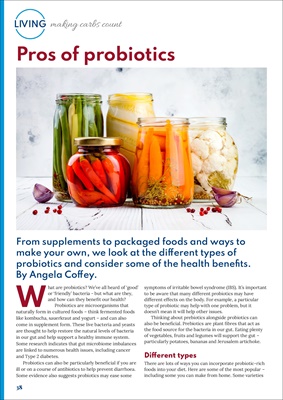
38
LIVING making carbs count
Pros of probiotics
From supplements to packaged foods and ways to
make your own, we look at the different types of
probiotics and consider some of the health benefits.
By Angela Coffey.
What are probiotics? We've all heard of 'good'
or 'friendly' bacteria - but what are they,
and how can they benefit our health?
Probiotics are microorganisms that
naturally form in cultured foods - think fermented foods
like kombucha, sauerkraut and yogurt - and can also
come in supplement form. These live bacteria and yeasts
are thought to help restore the natural levels of bacteria
in our gut and help support a healthy immune system.
Some research indicates that gut microbiome imbalances
are linked to numerous health issues, including cancer
and Type 2 diabetes.
Probiotics can also be particularly beneficial if you are
ill or on a course of antibiotics to help prevent diarrhoea.
Some evidence also suggests probiotics may ease some
symptoms of irritable bowel syndrome (IBS). It's important
to be aware that many different probiotics may have
different effects on the body. For example, a particular
type of probiotic may help with one problem, but it
doesn't mean it will help other issues.
Thinking about prebiotics alongside probiotics can
also be beneficial. Prebiotics are plant fibres that act as
the food source for the bacteria in our gut. Eating plenty
of vegetables, fruits and legumes will support the gut -
particularly potatoes, bananas and Jerusalem artichoke.
Different types
There are lots of ways you can incorporate probiotic-rich
foods into your diet. Here are some of the most popular -
including some you can make from home. Some varieties